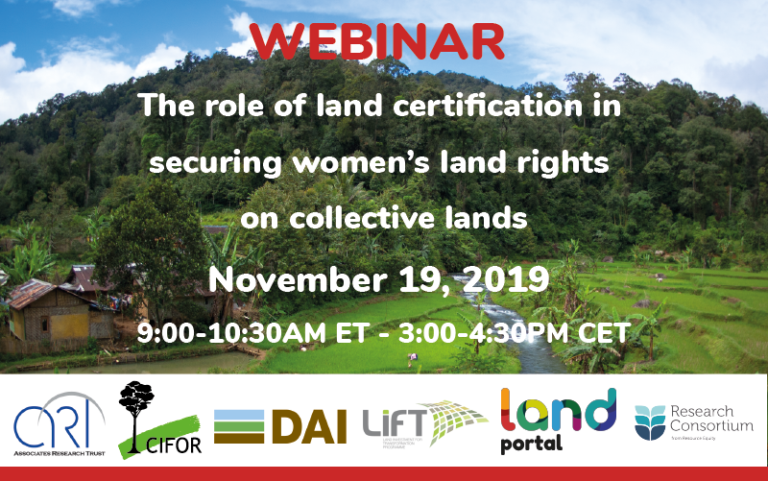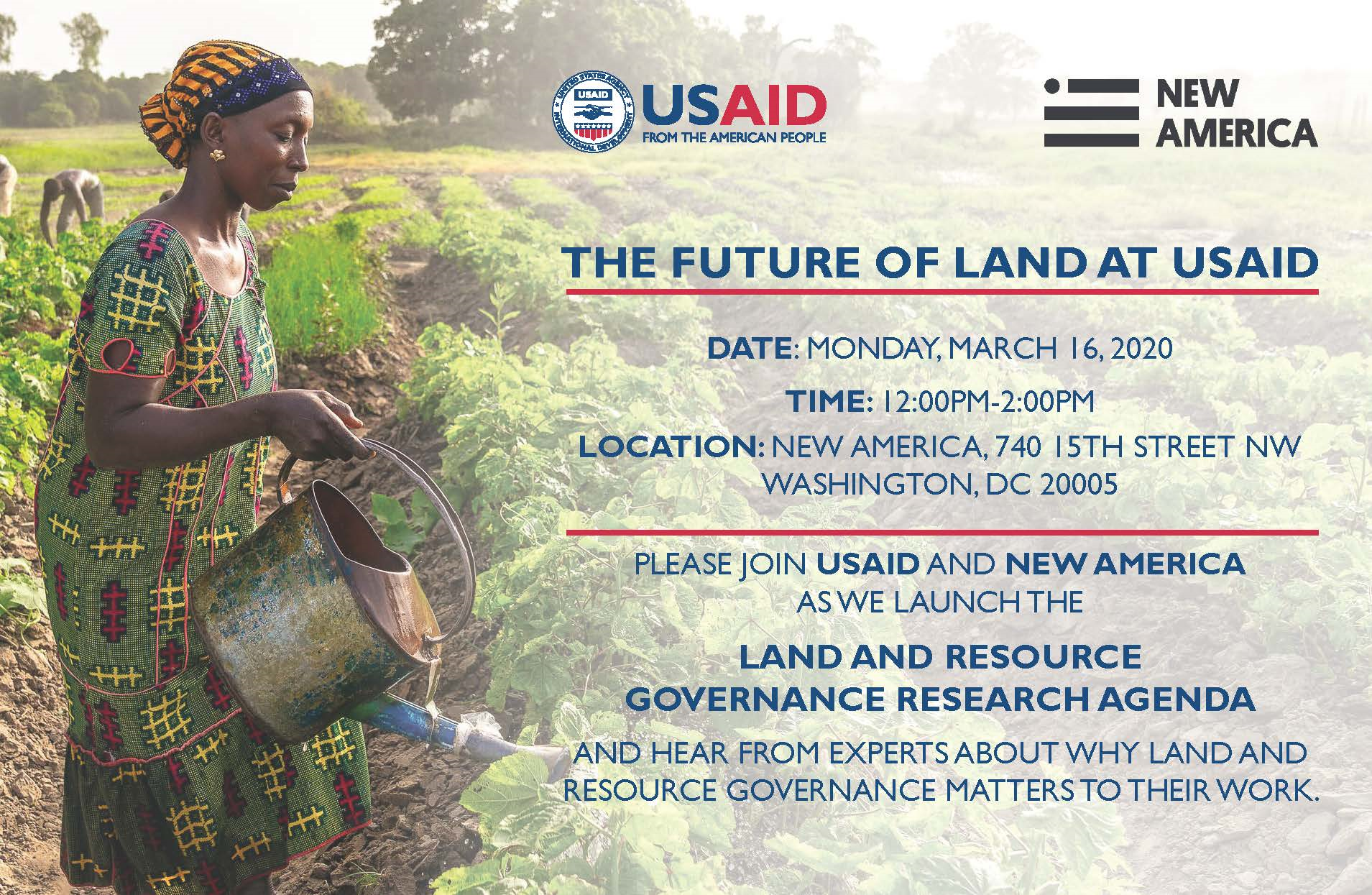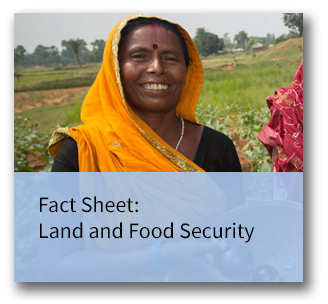16 March 2020. Secure land and resource rights are a cornerstone of economic growth and poverty reduction. Decades of evidence link improved land and resource governance with economic growth, food security, reduced deforestation, and a range of other benefits.
And yet, significant evidence and data gaps remain, which hamper effective programs and policies. Over the last two years USAID conducted a comprehensive review of the evidence in the land and resource governance sector. Based on this review, USAID developed a Land and Resource Governance Research Agenda, which will dictate its research priorities in this area over the coming years.
USAID and New America launched this Research Agenda with experts across the international development and global security space about why land and resource governance matters to their work.
The Future of Land at USAID - Research Agenda Launch - Recording forthcoming
Caleb Stevens Land and Resource Governance Advisor, USAID, E3/Office of Land & Urban
Why Land Matters for Global Development and Security
 25-29 November 2019. Abidjan. Conference on Land Policy in Africa
25-29 November 2019. Abidjan. Conference on Land Policy in Africa
The 3rd edition of the Conference on Land Policy in Africa was organised by the African Land Policy Centre which is a joint initiative of the African Union Commission, the United Nations Economic Commission for Africa, and the African Development Bank. The Conference was a policy and learning event whose goal is to deepen capacity for land policy in Africa through improved access to knowledge and information on land policy development and implementation. This Conference followed the second Conference held in November 2017 in Addis Ababa, Ethiopia that was attended by close to 450 participants.
Related:
And yet, significant evidence and data gaps remain, which hamper effective programs and policies. Over the last two years USAID conducted a comprehensive review of the evidence in the land and resource governance sector. Based on this review, USAID developed a Land and Resource Governance Research Agenda, which will dictate its research priorities in this area over the coming years.
USAID and New America launched this Research Agenda with experts across the international development and global security space about why land and resource governance matters to their work.
The Future of Land at USAID - Research Agenda Launch - Recording forthcoming
Caleb Stevens Land and Resource Governance Advisor, USAID, E3/Office of Land & Urban
Why Land Matters for Global Development and Security
- Anne-Marie Slaughter CEO, New America
- Rob Bertram Chief Scientist, USAID, Bureau for Food Security
- Zoe Tabary Property Rights Editor, Thomson Reuters Foundation
- Mark Plotkin Co-Founder and President, Amazon Conservation Team
- Yuliya Panfil Director, Future of Property Rights program, New America
- Applicants must be based in Ethiopia, Ghana, Guinea, Liberia, Tanzania, or Zambia.
- All applications submitted in response to this call MUST incorporate previously-generated USAID impact evaluation data available on USAID Land and Urban’s LandLinks
- The application deadline is April 3, 2020
Related:
 25-29 November 2019. Abidjan. Conference on Land Policy in Africa
25-29 November 2019. Abidjan. Conference on Land Policy in AfricaThe 3rd edition of the Conference on Land Policy in Africa was organised by the African Land Policy Centre which is a joint initiative of the African Union Commission, the United Nations Economic Commission for Africa, and the African Development Bank. The Conference was a policy and learning event whose goal is to deepen capacity for land policy in Africa through improved access to knowledge and information on land policy development and implementation. This Conference followed the second Conference held in November 2017 in Addis Ababa, Ethiopia that was attended by close to 450 participants.
There is a growing body of evidence suggesting that securing land and resource rights for men and
women has a positive impact on food security and broader development outcomes, such as household
investment, agricultural productivity, women’s empowerment, nutrition, and more robust rental
markets for farmland. The existing literature highlighting the positive impact of strengthened land tenure
on food security outcomes is discussed in this fact sheet
Related:
19 November 2019. Webinar: The role of land certification in securing women’s land rights on collective lands- In August of 2018 the Research Consortium launched a grant-making program. For the inaugural Request for Proposal the Consortium invited applicants to submit proposals on the topic of the effectiveness of land and resource tenure interventions to improve the lives of women.
- The grant-supported research covered interventions in Ethiopia, Uganda, and Indonesia/Peru/Uganda, each covering different intervention types: large-scale, systematic land certification to individual or jointly-held plots, issuing certificates of customary ownership on lands that are held collectively but are managed on an individual household basis, and formalization approaches on collective-held and communally managed rights to forest lands.

Related:
In Tajikistan, access to land is a fundamental right, and the productive use of agricultural land is a key economic driver. Advancing growth in the agriculture sector holds the potential to reduce poverty and improve food security in rural areas of the country. However, without a functioning land market, recent gains in land reform may...Read More
Haiti: Leveraging Land in Haiti Project
The Leveraging Land in Haiti Project will use technology and data, community mapping, and interactive training to strengthen land rights administration and land tenure security in the country. Background In Haiti, a complex and ambiguous land tenure system hampers economic and social development. Many families in Haiti are living informally on public lands without access...Read More
Haiti: Leveraging Land in Haiti Project
The Leveraging Land in Haiti Project will use technology and data, community mapping, and interactive training to strengthen land rights administration and land tenure security in the country. Background In Haiti, a complex and ambiguous land tenure system hampers economic and social development. Many families in Haiti are living informally on public lands without access...Read More
Integrated Land and Resource Governance (ILRG)
ZAMBIA, GHANA, MOZAMBIQUE, INDIA
Overview The majority of land in developing countries is not documented, and hundreds of millions of households in rural and urban areas lack secure rights to the land and resources they live and rely on. This impacts their ability and incentive to make long-term investments and it often limits access to finance. As a result,...Read More
Liberia: Land Governance Support Activity
The Land Governance Support Activity (LGSA) supports the establishment of more effective land governance systems, ready to implement comprehensive reforms to improve equitable access to land and security of tenure, so as to facilitate inclusive sustained growth and development, ensure peace and security, and provide sustainable management of the environment. LGSA is applying USAID’s collaborating,...Read More
ZAMBIA, GHANA, MOZAMBIQUE, INDIA
Overview The majority of land in developing countries is not documented, and hundreds of millions of households in rural and urban areas lack secure rights to the land and resources they live and rely on. This impacts their ability and incentive to make long-term investments and it often limits access to finance. As a result,...Read More
Liberia: Land Governance Support Activity
The Land Governance Support Activity (LGSA) supports the establishment of more effective land governance systems, ready to implement comprehensive reforms to improve equitable access to land and security of tenure, so as to facilitate inclusive sustained growth and development, ensure peace and security, and provide sustainable management of the environment. LGSA is applying USAID’s collaborating,...Read More



No comments:
Post a Comment